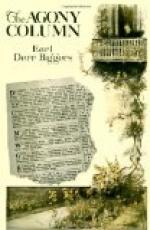I pleaded to be allowed to go back to my rooms, to communicate with my friends, and pay a visit to our consulate and to the Embassy; and at the colonel’s suggestion Bray agreed to this somewhat irregular course. So this afternoon I have been abroad with a constable, and while I wrote this long letter to you he has been fidgeting in my easy chair. Now he informs me that his patience is exhausted and that I must go at once. So there is no time to wonder; no time to speculate as to the future, as to the colonel’s sudden turn against me or the promise of his whisper in my ear. I shall, no doubt, spend the night behind those hideous, forbidding walls that your guide has pointed out to you as New Scotland Yard. And when I shall write again, when I shall end this series of letters so filled with—
The constable will not wait. He is as impatient as a child. Surely he is lying when he says I have kept him here an hour.
Wherever I am, dear lady, whatever be the end of this amazing tangle, you may be sure the thought of you—Confound the man!
Yours, in durance vile.
This fifth letter from the young man of the Agony Column arrived at the Carlton Hotel, as the reader may recall, on Monday morning, August the third. And it represented to the girl from Texas the climax of the excitement she had experienced in the matter of the murder in Adelphi Terrace. The news that her pleasant young friend—whom she did not know—had been arrested as a suspect in the case, inevitable as it had seemed for days, came none the less as an unhappy shock. She wondered whether there was anything she could do to help. She even considered going to Scotland Yard and, on the ground that her father was a Congressman from Texas, demanding the immediate release of her strawberry man. Sensibly, however, she decided that Congressmen from Texas meant little in the life of the London police. Besides, she night have difficulty in explaining to that same Congressman how she happened to know all about a crime that was as yet unmentioned in the newspapers.
So she reread the latter portion of the fifth letter, which pictured her hero marched off ingloriously to Scotland Yard and with a worried little sigh, went below to join her father.
CHAPTER VII
In the course of the morning she made several mysterious inquiries of her parent regarding nice points of international law as it concerned murder, and it is probable that he would have been struck by the odd nature of these questions had he not been unduly excited about another matter.
“I tell you, we’ve got to get home!” he announced gloomily. “The German troops are ready at Aix-la-Chapelle for an assault on Liege. Yes, sir—they’re going to strike through Belgium! Know what that means? England in the war! Labor troubles; suffragette troubles; civil war in Ireland—these things will melt winter in Texas. They’ll go in. It would be national suicide if they didn’t.”




